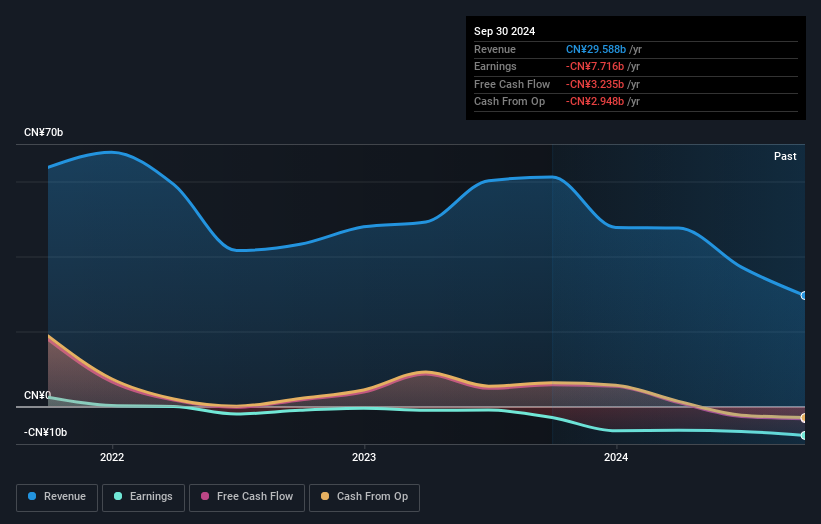- China
- /
- Real Estate
- /
- SHSE:600376
Private companies among Beijing Capital Development Co., Ltd.'s (SHSE:600376) largest shareholders, saw gain in holdings value after stock jumped 9.3% last week

Key Insights
- The considerable ownership by private companies in Beijing Capital Development indicates that they collectively have a greater say in management and business strategy
- The top 2 shareholders own 53% of the company
- Institutional ownership in Beijing Capital Development is 13%
If you want to know who really controls Beijing Capital Development Co., Ltd. (SHSE:600376), then you'll have to look at the makeup of its share registry. The group holding the most number of shares in the company, around 53% to be precise, is private companies. In other words, the group stands to gain the most (or lose the most) from their investment into the company.
As a result, private companies were the biggest beneficiaries of last week’s 9.3% gain.
In the chart below, we zoom in on the different ownership groups of Beijing Capital Development.
See our latest analysis for Beijing Capital Development

What Does The Institutional Ownership Tell Us About Beijing Capital Development?
Institutional investors commonly compare their own returns to the returns of a commonly followed index. So they generally do consider buying larger companies that are included in the relevant benchmark index.
As you can see, institutional investors have a fair amount of stake in Beijing Capital Development. This can indicate that the company has a certain degree of credibility in the investment community. However, it is best to be wary of relying on the supposed validation that comes with institutional investors. They too, get it wrong sometimes. It is not uncommon to see a big share price drop if two large institutional investors try to sell out of a stock at the same time. So it is worth checking the past earnings trajectory of Beijing Capital Development, (below). Of course, keep in mind that there are other factors to consider, too.

We note that hedge funds don't have a meaningful investment in Beijing Capital Development. Our data shows that Beijing Capital Development Holding (Group) Co., Ltd is the largest shareholder with 47% of shares outstanding. With 5.5% and 4.8% of the shares outstanding respectively, Beijing Shoukai Tianhong Group Co. and June Life Insurance Co., Ltd., Asset Management Arm are the second and third largest shareholders.
After doing some more digging, we found that the top 2 shareholders collectively control more than half of the company's shares, implying that they have considerable power to influence the company's decisions.
While it makes sense to study institutional ownership data for a company, it also makes sense to study analyst sentiments to know which way the wind is blowing. As far as we can tell there isn't analyst coverage of the company, so it is probably flying under the radar.
Insider Ownership Of Beijing Capital Development
While the precise definition of an insider can be subjective, almost everyone considers board members to be insiders. The company management answer to the board and the latter should represent the interests of shareholders. Notably, sometimes top-level managers are on the board themselves.
I generally consider insider ownership to be a good thing. However, on some occasions it makes it more difficult for other shareholders to hold the board accountable for decisions.
Our data cannot confirm that board members are holding shares personally. Not all jurisdictions have the same rules around disclosing insider ownership, and it is possible we have missed something, here. So you can click here learn more about the CEO.
General Public Ownership
The general public, who are usually individual investors, hold a 34% stake in Beijing Capital Development. While this size of ownership may not be enough to sway a policy decision in their favour, they can still make a collective impact on company policies.
Private Company Ownership
It seems that Private Companies own 53%, of the Beijing Capital Development stock. It might be worth looking deeper into this. If related parties, such as insiders, have an interest in one of these private companies, that should be disclosed in the annual report. Private companies may also have a strategic interest in the company.
Next Steps:
It's always worth thinking about the different groups who own shares in a company. But to understand Beijing Capital Development better, we need to consider many other factors. Consider risks, for instance. Every company has them, and we've spotted 2 warning signs for Beijing Capital Development you should know about.
Of course this may not be the best stock to buy. So take a peek at this free free list of interesting companies.
NB: Figures in this article are calculated using data from the last twelve months, which refer to the 12-month period ending on the last date of the month the financial statement is dated. This may not be consistent with full year annual report figures.
Valuation is complex, but we're here to simplify it.
Discover if Beijing Capital Development might be undervalued or overvalued with our detailed analysis, featuring fair value estimates, potential risks, dividends, insider trades, and its financial condition.
Access Free AnalysisHave feedback on this article? Concerned about the content? Get in touch with us directly. Alternatively, email editorial-team (at) simplywallst.com.
This article by Simply Wall St is general in nature. We provide commentary based on historical data and analyst forecasts only using an unbiased methodology and our articles are not intended to be financial advice. It does not constitute a recommendation to buy or sell any stock, and does not take account of your objectives, or your financial situation. We aim to bring you long-term focused analysis driven by fundamental data. Note that our analysis may not factor in the latest price-sensitive company announcements or qualitative material. Simply Wall St has no position in any stocks mentioned.
About SHSE:600376
Beijing Capital Development
Operates as a real estate development company in China.
Mediocre balance sheet and slightly overvalued.


